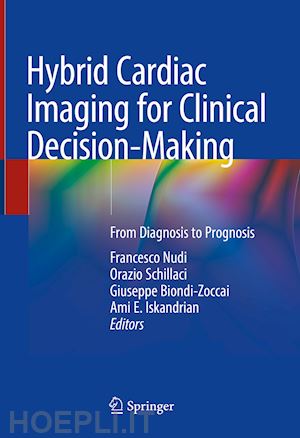
Questo prodotto usufruisce delle SPEDIZIONI GRATIS
selezionando l'opzione Corriere Veloce in fase di ordine.
Pagabile anche con Carta della cultura giovani e del merito, 18App Bonus Cultura e Carta del Docente
Performing any diagnostic test in medicine is always a matter of trying to get the condition of the patient diagnosed properly with the least effort, exposure, discomfort and at the same time with the lowest possible error probability.
Pre-test probability is helpful but often imprecise, effectively overestimating the patient's risk profile. In a broader prevention objective, the phases of a disease, its onset, progression, and complications must be taken into account. The negative predictive value, which is so important, has in turn its main limitation in identifying the healthy patient, that is, the one who does not belong to any cluster of patients in which we would act in terms of prevention.
In coronary syndromes, the goal is instead to evaluate coronary heart disease, from mild to more extensive and significant forms. For this purpose, it is necessary to use parameters that investigate different and complementary aspects: stenosis, ischemia, the morphology ofthe atherosclerotic plaque, metabolic processes, in particular vitality and apoptosis, the presence of inflammatory processes.
The possibility, already present thanks to Hybrid Imaging, of 'joining’ exams that study different aspects, will allow the patient to be increasingly characterized not only from a diagnostic point of view but also from a prognostic and personalized therapeutic choice.
Orazio Schillaci received his medical diploma and nuclear medicine training from Sapienza University of Rome, and nuclear medicine training at Tor Vergata University of Rome. After holding academic appointments at L’Aquila University, he joined the faculty at Tor Vergata University of Rome, where he is currently a Full Professor of Nuclear Medicine, Director of the Nuclear Medicine Residency, and Dean of the Medical School. He has published more than 200 articles indexed in PubMed, and serves on the editorial boards of some of the leading nuclear medicine journals.
Giuseppe Biondi-Zoccai received his medical diploma from the University of Milan, completed cardiology training at the Catholic University of Rome, and eventually refined his statistical expertise with an MStat diploma at Tor Vergata University, Rome, Italy. He has also pursued additional training at Hopital Hautepierre, Strasbourg, France, UK, Hammersmith Hospital, London, UK, and Mount Sinai Medical Center, New York, USA, among others. He is currently an Associate Professor of Cardiology at Sapienza University of Rome, Latina, Italy. He is an accomplished interventional cardiologist and clinical researcher, with a specific focus on outcome research. He has published more than 900 articles indexed in PubMed and edited several textbooks on clinical research and practice.
Ami E. Iskandrian received his medical degree from the University of Baghdad, Iraq, and moved to Philadelphia, USA, where he completed residencies in internal medicine and cardiology at Hahnemann University. He was appointed Professor of Medicine at Hahnemann, where he served as Director of Nuclear Cardiology at the Cardiovascular Institute. He also served as a Professor of Medicine at Allegheny University and the Philadelphia Heart Institute. He then moved to the University of Alabama at Birmingham, AL, USA, where he is currently a Distinguished Professor of Medicine and Radiology and Director of the Nuclear Cardiology program. He has authored more than 700 scholarly publications and serves as Editor-in-Chief of the Journal of Nuclear Cardiology, the leading publication for nuclear cardiologists worldwide.











Il sito utilizza cookie ed altri strumenti di tracciamento che raccolgono informazioni dal dispositivo dell’utente. Oltre ai cookie tecnici ed analitici aggregati, strettamente necessari per il funzionamento di questo sito web, previo consenso dell’utente possono essere installati cookie di profilazione e marketing e cookie dei social media. Cliccando su “Accetto tutti i cookie” saranno attivate tutte le categorie di cookie. Per accettare solo deterninate categorie di cookie, cliccare invece su “Impostazioni cookie”. Chiudendo il banner o continuando a navigare saranno installati solo cookie tecnici. Per maggiori dettagli, consultare la Cookie Policy.